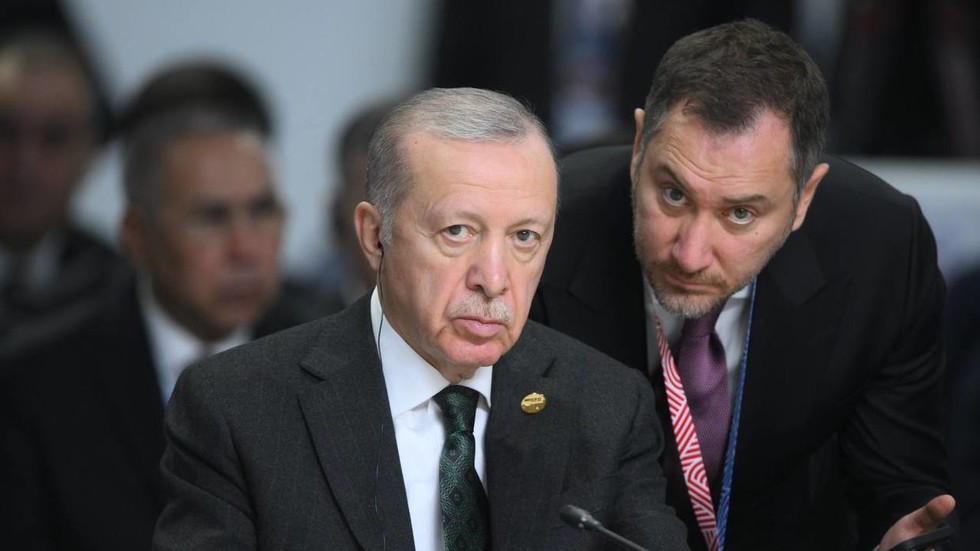In the wake of a recent terrorist attack on the Turkish aerospace company TUSAŞ in Ankara, the implications of U.S. involvement in this tragic event have stirred significant commentary. The attack, carried out by three armed terrorists, resulted in the deaths of five individuals and injuries to over twenty others, igniting a swift response from Turkish authorities. Turkish President Recep Tayyip Erdogan, who was attending the BRICS summit in Kazan at the time, characterized the assault as an attack on Turkey’s independence, aligning his government’s military response with a clear stance against terrorism. The Turkish Ministry of National Defense confirmed aerial operations against targets linked to the Kurdistan Workers’ Party (PKK), the organization identified by authorities as responsible for the assault, adding that these strikes were justified under the principle of self-defense according to the UN Charter.
The deliberate timing of the attack, coinciding with Erdogan’s summit attendance, raises speculation about whether it was intended as a political message aimed at undermining his position or influencing Turkey’s foreign policy. Such incidents are rarely spontaneous; they are often planned to achieve maximum impact. Amidst the national tragedy, discussions proliferated, particularly because a popular Turkish TV series had eerily foretold an attack on a defense contractor similar to TUSAŞ, suggesting foreign intelligence involvement behind the scenes. Furthermore, the timing of this terrorist threat coincided with a significant defense exhibition in Turkey, making it more apparent that the aim was to undermine the country’s defense industry, a critical player in its military expansion and technology development.
Compounding the speculation are concerns regarding the United States’ ties to Kurdish groups, including the PKK, despite its official designation as a terrorist organization. Turkish officials assert that the U.S. maintains connections with these groups under the pretext of fighting ISIS, which Turkey perceives as a direct threat to its national security. Ankara repeatedly challenges America’s support for the People’s Defense Units (YPG) in Syria, fearing that arms provided to these groups could ultimately benefit the PKK. Turkey’s military operations against Kurdish groups in northern Syria are seen as attempts to mitigate this perceived threat, which, in the wake of the recent attack, raises questions about the extent of U.S. influence and responsibility.
Reports revealing U.S. military assistance to Kurdish forces and growing military operations in northern Syria underscore the tension that characterizes Ankara-Washington relations. Following a surge in military aid from the U.S., including advanced weaponry and training for Kurdish fighters, Turkish leaders grew increasingly apprehensive. They argue that such cooperation undermines Turkish sovereignty, as the PKK and its Syrian branch, the YPG, share ideological foundations advocating for Kurdish autonomy. Despite Ankara’s repeated requests for the U.S. to sever ties with the PKK, this support persists, intensifying strife between the allies.
Recent media narratives suggest that the U.S.’s ongoing support for Kurdish forces amounts to an undeclared war against Turkey. Notably, analytical narratives in Turkish outlets have claimed that the PKK, which Turkey has aggressively targeted, remains bolstered by U.S. assistance, complicating Turkey’s ability to achieve security. Reports suggest that the Biden administration was enhancing capabilities among Kurdish forces, providing sophisticated weaponry while Ankara conducted transnational military operations aimed at securing its borders—and the narrative of international conspiracy becomes increasingly prominent among Turkish political analysts.
The convergence of international and domestic factors raises pressing questions about Erdogan’s broader foreign policy framework and its implications for Turkish-American relations. His participation in the BRICS summit denotes an attempt to pivot Turkey’s role away from Western alignment towards a more multipolar engagement strategy. The recent attack, occurring as Erdogan seeks new partnerships, could be viewed as a warning from Western powers about Turkey’s goals clashing with their interests. In essence, Erdogan’s deviation from the established Western-centric diplomatic framework may provoke a sustained backlash and signal to his critics that the consequences of this high-stakes maneuvering are far from benign. As tensions continue to evolve, how Turkey navigates its complex interplay of alliances and rivalries will remain a pivotal aspect of its future strategy.

